The rise in public discourse around seed oils isn’t just another health fad. Seed oils, high in omega-6 linoleic acid and pervasive in almost all processed foods, are increasingly being linked to inflammation, heart disease, and other chronic health issues. But how did these oils come to dominate our food supply, and why are more people sounding the alarm now? In this article, we’ll explore the origins, health concerns, and societal impacts of seed oils, shedding light on why this conversation matters—and how you can take control of your health.
The Rise of Seed Oils: How They Took Over Our Food System
Seed oils like soybean, corn, and canola weren’t always the go-to cooking oils. Historically, our diets were based on traditional fats like butter, lard, and tallow, which contain a balance of fats and are stable at high temperatures. But with the advent of industrialization and a demand for cheap, long-lasting oils, seed oils became a staple. Corn, soybeans, and cotton were grown in abundance in the United States, and the byproducts of these crops were channeled into the production of oils. Backed by aggressive marketing campaigns, seed oils were sold as healthy alternatives to animal fats, claiming heart-health benefits based on their unsaturated fat content.
But these claims didn’t go unchallenged. Studies now show that seed oils contribute to health problems through their high levels of omega-6 fatty acids, which promote inflammation when consumed in excess. Compared to the 1:1 or 4:1 ratio of omega-6 to omega-3 fatty acids seen in traditional diets, the Western diet can reach a ratio as high as 20:1, largely due to seed oils.
The Health Risks of Linoleic Acid: Why Seed Oils Are Problematic
Linoleic acid, the main fatty acid in seed oils, is an omega-6 polyunsaturated fat. While essential in small amounts, consuming it in excess can create significant health risks. Research suggests that high omega-6 intake skews the body’s natural balance, leading to chronic inflammation. Omega-6 fatty acids increase the susceptibility of LDL particles to oxidation, which is now recognized as a key contributor to heart disease. When LDL particles oxidize, they are more likely to form plaque in the arteries, increasing the risk of cardiovascular issues.
Furthermore, seed oils go through extensive processing, involving high heat and chemical solvents, which increases the risk of oxidative stress in the body. This process not only strips the oil of any beneficial compounds but also introduces harmful byproducts, such as aldehydes, which are associated with respiratory diseases and cancer. Studies have shown that these oils increase inflammation markers and the oxidative stress load in the body, which can damage cells and lead to chronic conditions.
The Story of President Eisenhower and the Heart Disease Epidemic
Heart disease was relatively rare in the early 1900s, but by the mid-20th century, rates skyrocketed. In 1955, President Dwight D. Eisenhower suffered a heart attack, bringing national attention to the growing heart disease epidemic. Interestingly, Eisenhower’s heart health continued to decline despite following a low-fat diet heavy in seed oils, specifically soybean oil and seed-oil-based margarine. His diet, intended to keep cholesterol low, may have unintentionally worsened his health by increasing his omega-6 intake. President Eisenhower’s story reflects a pivotal moment in U.S. dietary history, one that shaped public health policies for decades to come.
Unfortunately, at the time, public health recommendations focused on lowering cholesterol and saturated fat intake without fully understanding the impact of replacing these fats with polyunsaturated seed oils. It wasn’t until later that researchers realized oxidized LDL is a much stronger predictor of heart disease than cholesterol levels alone. Today, studies confirm that high intake of linoleic acid, like smoking, induces oxidative stress and damages the arteries—a risk factor that may well have contributed to Eisenhower’s health decline.
The Shift to Seed Oils: McDonald’s and the Push from Tallow to Vegetable Oils
Before the 1980s, McDonald’s famously cooked its French fries in beef tallow, which is a stable, saturated fat that doesn’t oxidize at high temperatures. The resulting flavor and stability were widely celebrated, but with the rise of the anti-saturated fat movement, McDonald’s switched to partially hydrogenated vegetable oils, leading to a sharp increase in trans fat consumption among Americans. Trans fats were later found to be highly detrimental to heart health, causing McDonald’s to eventually reformulate again. This change reflects how dietary trends, influenced by lobbying and public pressure, have pushed industries to adopt seed oils without clear long-term health benefits.
Seed Oils and Modern Chronic Disease: The Evidence Mounts
In the 1960s, seed oils were promoted as “heart-healthy” options because they lowered cholesterol levels. The American Heart Association (AHA) even began recommending polyunsaturated fats over saturated fats, despite a lack of controlled studies demonstrating their efficacy. The belief that lowering cholesterol equates to heart disease prevention led to the widespread adoption of seed oils. However, as research progressed, the evidence began to show that reducing cholesterol alone doesn’t necessarily improve heart health. Instead, it’s the oxidation of LDL that drives atherosclerosis and other cardiovascular issues.
Multiple human clinical trials now confirm the risks of high seed oil intake. Studies have demonstrated that seed oil consumption increases the oxidation of LDL particles, which damages the arterial walls and leads to inflammation. Other studies show that populations consuming traditional diets, low in processed seed oils, have significantly lower rates of heart disease. Autopsies of individuals who died of heart disease in the U.S. show much higher levels of linoleic acid in their fat tissues compared to those who died from non-cardiovascular causes.
The Call to Action: Robert F. Kennedy Jr.’s Mission Against Seed Oils
Prominent figures like Robert F. Kennedy Jr. have joined the conversation, calling for a national reduction in seed oil consumption. Kennedy’s mission highlights the role of seed oils in chronic diseases, asserting that their overconsumption has contributed to America’s health crisis. With the current high rates of heart disease, diabetes, and obesity, Kennedy argues that replacing seed oils with healthier fats like tallow and coconut oil could reduce inflammation and improve overall health.
His advocacy emphasizes the urgent need for dietary reform, as seed oils have become pervasive in nearly every processed food, restaurant dish, and even many olive oils through dilution. His stance supports the idea that a return to natural fats, such as beef tallow and unrefined coconut oil, would not only restore balance to the diet but could also save lives by reducing inflammation and oxidative stress.
Healthier Alternatives: Choosing Fats That Work for Your Body
While seed oils are hard to avoid, there are healthier alternatives:
Beef Tallow: This traditional fat is stable at high temperatures and provides a rich source of saturated fat, which is less prone to oxidation. Tallow was used widely before the seed oil revolution, and its nutritional profile supports cellular health.
Unrefined Coconut Oil: Rich in medium-chain triglycerides (MCTs), coconut oil offers quick energy for the brain and body and doesn’t oxidize easily. Unrefined coconut oil also contains lauric acid, which has antimicrobial properties.
Extra Virgin Olive Oil: While olive oil is often diluted with seed oils, high-quality, certified extra virgin olive oil is rich in monounsaturated fats and antioxidants, both of which support heart health. When choosing olive oil, look for reputable brands that test for purity to avoid the risk of seed oil contamination.
These fats align better with our bodies’ needs, promoting cellular health and reducing oxidative stress. Switching to these oils can help restore the natural balance of omega-6 and omega-3 fatty acids, reducing inflammation and improving overall well-being.
Avoiding Seed Oils: Practical Tips for Everyday Life
Eliminating seed oils may be challenging, but here are a few strategies to help reduce your intake:
Check Ingredient Labels: Seed oils are found in most processed foods. Look for ingredients like soybean oil, corn oil, canola oil, and other vegetable oils, and opt for products without them.
Cook at Home: When you prepare meals at home, you have control over the fats you use. Choose stable fats like tallow, coconut oil, and olive oil for cooking.
Dine Mindfully: At restaurants, seed oils are commonly used for frying and sautéing. Whenever possible, opt for dishes that are grilled, steamed, or served raw to reduce exposure.
Choose Whole Foods: Whole, unprocessed foods are free from added seed oils and contain naturally balanced nutrients. Eating more whole foods not only reduces seed oil intake but also supports a nutrient-dense diet.
Conclusion: Embracing the Seed Oil Awakening
The growing awareness around seed oils is a step in the right direction. As more people recognize the health risks associated with these oils, the demand for healthier alternatives will grow. From President Eisenhower’s heart health journey to RFK Jr.’s current mission to eliminate seed oils, history has shown us that dietary choices have far-reaching effects on public health. By opting for healthier fats and understanding the science behind our food, we can take control of our health and reduce the risk of chronic disease.
In a world where seed oils are nearly unavoidable, taking small steps to reduce your intake can make a significant difference. Choosing natural fats that support rather than hinder our health may be the key to reversing the modern health crisis—and it’s a movement that’s only just beginning.









